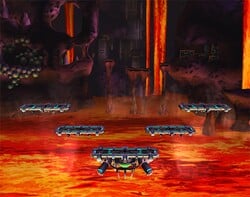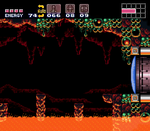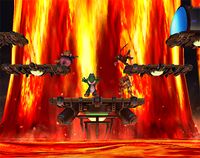Norfair
| Norfair | |
|---|---|
 File:MetroidSymbol.png | |
| Universe | Metroid |
| Appears in | SSBB |
| Availability | Starter |
| Crate type | Futuristic |
| Tracks available | Main Theme (Metroid) Ending (Metroid) Norfair Theme of Samus Aran, Space Warrior Battle Scene / Final Boss (Golden Sun) Marionation Gear Bolded song must be unlocked |
| Article on Metroid Wiki | Norfair |
Norfair (ノルフェア Norufea) is a starting stage in Super Smash Bros. Brawl. It was confirmed by Masahiro Sakurai on the Smash Bros. DOJO!! on November 9, 2007.[1] However, it was revealed some time before, as it was selectable for play in the Brawl demo, which was available during many events in Q4 2007. It was the only stage that hadn't already been announced to feature in this demo.
Origin
In the original Metroid for the NES, Norfair was one of the six areas Samus Aran had to venture through. It was situated at the lowest point of the Planet Zebes and consisted of large, volcanic caves. Samus required numerous suit upgrades to be able to withstand the extreme heat. The area similarly appeared in Super Metroid for the SNES and retained most of the original characteristics. In addition, the volcano theme has recurred throughout the Metroid universe. This design of this stage resembles the Norfair in Super Metroid rather the one in Metroid. In Metroid and Super Metroid, there doors that open when damaged. In this stage those doors are for the entrance to the safe zone during the lava wave and they can also be seen in the background.
In Super Metroid's Norfair, there is a room that features rising lava. Samus has to try to get to the other side of the room, climb up platforms, and enter another room before the lava kills her. The rising lava in this stage could be a reference to the room with the lava continuously rising. Also, the idea of opening the bubble doors to escape from the lava could also derived from this room.
Stage Elements
In SSBB, Norfair has five small platforms in the air, arranged in a V formation, with a volatile sea of lava at the bottom of the stage. The pass-through platforms are ideal for characters with far-reaching ground attacks or for characters with a good air game/up special.
As the player fights on Norfair, lava will rise every so often and cover the platforms, similar to the acid in Planet Zebes in Super Smash Bros. and Brinstar in Super Smash Bros. Melee. It can rise to three different levels and causes strong fire damage, but prevents KOs via the lower blast line. Lava sometimes falls from the sides too - this hazard covers over half of the stage. A wave of lava will also appear from time to time, slowly approaching the stage from the background. When this wave forms, a safe area will pop up on a random platform, with the design based on the bubble doors from the Metroid universe. It is unnecessary to fight for this safe haven as all lava hazards can be dodged, air dodged, shielded and even perfect shielded with decent timing, and since characters can still be hit through the refuge by those on the outside, it can be more of a hindrance than a help. It is also possible with characters with many short jumps such as King Dedede, Kirby, Meta Knight, Pit and Jigglypuff to completely avoid the wave by jumping over it. The final stage hazard of Norfair are the ocassional showers of lava that spurt in an arc and land on the middle platforms, which are better avoided than shielded given the difficulty in determining where they will hit.
Currently, Norfair is officially ruled as a "counter-pick/banned" by the SBR, but is frequently banned in tournament play. Proponents of banning the stage claim that the increased number of edges promotes stalling the game by constantly alternating between edges for invincibility, and that the lava plumes provide an unnecessary degree of unpredictability. Those who believe the stage should be counter-pickable insist that ledge-stalling is not that effective, and that the uniqueness of the stage is not brought down by the hazards, which can be defended against fairly easily. Regardless, the stage can assist characters who are easily gimped, since they are given more opportunities to grab an edge (especially tethers).
Trivia
- Due to the nature of the the hazards, it is possible for only one of the platforms to be safe to stand on, with the other four being covered by a combination of high lava tide and the lava fall from the left or right.
- A new platform is created in the background for the Pokémon Trainer to move around on if he is selected, however, the lava wave is in front of him.
- If the player uses Zelda/Sheik's Transform move just before they touch the lava at the bottom when the stage lowers, it is possible to either take a few hits from the lava until they rise again from it, or get KO'd.
- With proper timing, it is possible to avoid damage from the large lava wave by sidestepping and by using Marth and Ike's Counter or Lucario's Double Team. Also, anyone can use the several edges and block the lava with the help of the invincibility. And Kirby and other characters with multiple mid-air jumps can float off the top of the screen just before the lava hits and take no damage. However, with this method the player must beware of KO boundaries. Kirby can also avoid it using Stone. Pokémon Trainer can switch his Pokémon and Wario can Wario Waft and take no damage.
- The safe zone that comes when the lava wave appears will always spawn an item.
- This is the only stage in Brawl in which the music track with the same name as the stage has to be unlocked.
- This stage is most commonly counter-picked by Link players as his poor recovery and tether are both significantly aided by the number and placement of the platforms.
References
- ^ Norfair. Smash Bros. DOJO!!. smashbros.com (2007-11-09). Retrieved on 2007-11-09.
|
| |
|---|---|
| Fighters | Samus (SSB · SSBM · SSBB · SSB4 · SSBU) · Zero Suit Samus (SSBB · SSB4 · SSBU) · Ridley (SSBU) · Dark Samus (SSBU) |
| Assist Trophies | Metroid · Dark Samus · Mother Brain |
| Bosses | Ridley · Meta Ridley |
| Stages | Planet Zebes · Brinstar · Brinstar Depths · Frigate Orpheon · Norfair · Pyrosphere Brinstar Escape Shaft (Adventure Mode) |
| Item | Screw Attack · Power Suit Piece |
| Enemies | Geemer · Kihunter · Metroid · Reo · FG II-Graham · Joulion · Zero |
| Other | Gunship · Kraid |
| Trophies, Stickers and Spirits | Trophies (SSBM · SSBB · SSB4) · Stickers · Spirits |
| Music | Brawl · SSB4 · Ultimate |
| Masterpieces | Metroid · Super Metroid |

